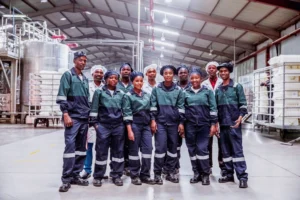The oil and gas industry operates in one of the most challenging and volatile environments in the global economy. With fluctuations in oil prices, geopolitical risks, and the growing call for sustainable energy, companies face immense pressure to remain competitive. At the heart of navigating these complexities is a workforce that requires not only technical expertise but also robust leadership.
This article explores why leadership matters in the energy sector, the benefits of leadership training, and how companies can implement effective leadership development programs.
What is Leadership Development?
Leadership Development refers to the process of improving and enhancing an individual’s ability to lead and manage effectively. It involves the cultivation of skills, knowledge, and behaviors that are necessary for guiding teams, making strategic decisions, and driving organizational success.
Why Leadership Matters in Oil & Gas
In the oil and gas sector, leadership is not just about overseeing teams—it’s about ensuring that operations run smoothly in high-risk environments while adapting to rapid industry changes. The following points highlight the critical role leadership plays in this field:
1. Safety and Compliance
Oil and gas operations involve high-risk activities such as drilling, refining, and transporting hazardous materials. Leaders must establish a culture of safety and ensure that all team members adhere to strict safety regulations. Failure to do so can lead to catastrophic accidents and significant financial and reputational damage.
2. Operational Effectiveness
Efficient workflows and process optimization are essential for maintaining competitiveness. Leaders in the industry must be capable of driving productivity improvements and ensuring that projects stay on time and within budget.
3. Workforce Engagement and Retention
The industry faces a skill shortage due to the aging workforce and competition from other sectors. Strong leadership is key to building engagement, fostering employee loyalty, and developing the next generation of industry professionals.
4. Crisis Management and Decision-Making
Leaders must be able to respond effectively to crises, whether it’s an operational incident, market downturn, or geopolitical issue. Strong decision-making skills enable leaders to guide their teams through uncertainty and minimize disruptions.
5. Adaptability to Industry Trends
The shift towards renewable energy and digital transformation requires leaders to be adaptable and forward-thinking. Those who can embrace innovation will position their organizations for future success
Benefits of Leadership Development
Strong leadership within this sector is essential for several reasons:
- Safety and Risk Management: The industry’s operations often involve hazardous environments, and effective leadership ensures that safety protocols are strictly followed, mitigating the risk of accidents.
- Operational Efficiency: Leaders in oil and gas are responsible for optimizing processes that can significantly impact productivity and profitability.
- Talent Retention: As the industry competes for top talent, leaders play a critical role in developing and retaining skilled employees.
- Strategic Decision-Making: The ability to make informed, timely decisions is crucial, especially in a sector where delays can lead to substantial financial losses.
The Need for Leadership Development in Oil & Gas
While the importance of leadership is clear, many oil and gas companies face leadership gaps that must be addressed to ensure long-term success. Key challenges include:
- Aging Workforce: The industry is experiencing a wave of retirements among experienced leaders, creating a leadership vacuum that needs to be filled with trained successors.
- Skill Mismatches: Technical expertise alone is not enough. Leaders must also have strong communication, strategic thinking, and people management skills.
- Limited Leadership Training Opportunities: In many cases, leadership development programs are either nonexistent or not tailored to the unique needs of the sector.
- Evolving Business Landscape: The rise of digital technologies, automation, and sustainability mandates requires leaders to develop new competencies.
Addressing these challenges through structured leadership development programs will strengthen the oil and gas workforce and prepare organizations to navigate future disruptions.
Benefits of Leadership Training and Development in the Oil & Gas Industry
Investing in leadership development provides substantial benefits to organizations, employees, and the industry as a whole. Here are some of the key advantages:
- Enhancing Safety Culture
Leadership training helps managers instill a culture of safety within their teams. Strong leaders can effectively communicate safety protocols, model safe behaviors, and ensure compliance with regulations.
- Improving Decision-Making and Problem-Solving
Effective leadership programs develop strategic thinking and problem-solving skills. Leaders who can assess risks, analyze data, and make informed decisions contribute to smoother operations and crisis management.
- Driving Operational Efficiency
Trained leaders understand how to optimize workflows, manage resources effectively, and enhance productivity. This is critical in an industry where operational delays can lead to substantial financial losses.
- Strengthening Talent Retention and Engagement
Employees are more likely to stay with a company that invests in their professional growth. Leadership development programs not only prepare future leaders but also foster a culture of continuous improvement.
- Building a Pipeline of Future Leaders
Structured training ensures a steady flow of skilled leaders ready to step into key roles. This reduces the impact of leadership transitions and ensures business continuity.
- Fostering Innovation and Adaptability
As the energy landscape evolves, leaders must be equipped to embrace new technologies and sustainability initiatives. Leadership programs that focus on innovation help companies remain competitive.
Keys to Successful Leadership Development Programs
- Alignment with Business Goals
Leadership programs must be tailored to the organization’s strategic objectives, ensuring that leaders develop skills relevant to business needs.
- Integration of Learning and Practical Experience
A combination of training, real-world applications, and mentoring provides leaders with hands-on experience.
- Focus on Emerging Competencies
As the industry evolves, leadership training should incorporate digital skills, sustainability awareness, and adaptability to change.
- Commitment from Top Management
Successful programs require buy-in from senior leaders who champion leadership development as a core company priority.
Practical Steps for Implementing Leadership Development in Oil & Gas
For oil and gas organizations looking to strengthen their leadership pipeline, developing and implementing effective leadership programs is essential. Below are practical steps to ensure success.
- Assess Leadership Gaps and Business Needs
Conduct leadership assessments to identify skill gaps and determine the areas that need development. This can be done through leadership competency frameworks, 360-degree feedback, and performance evaluations.
Align leadership development objectives with business goals, ensuring that training focuses on strategic priorities such as safety, innovation, and operational efficiency.
- Design a Structured Leadership Development Program
Develop a program that combines multiple learning approaches, including classroom training, on-the-job experiences, mentoring, and coaching.
Tailor training to different leadership levels, ensuring that new managers, mid-level leaders, and senior executives receive relevant skill development.
- Incorporate Real-World Experiences and Mentorship
Provide leaders with real-world projects and challenges to apply their learning in practical settings. This helps them build confidence and adaptability.
Establish mentorship programs where experienced leaders guide and support emerging talent.
- Focus on Safety, Innovation, and Digital Skills
In the oil and gas industry, leadership training must emphasize safety leadership, as well as innovation and digital competencies.
Incorporate emerging technologies into training, helping leaders understand how digital transformation impacts operations.
- Measure and Track Leadership Development Impact
Implement key performance indicators (KPIs) to measure the effectiveness of leadership programs. Metrics can include safety improvements, operational efficiency gains, and leadership readiness.
Use data-driven insights to refine and enhance training programs over time.
- Leverage Internal and External Partnerships
Collaborate with educational institutions, industry associations, and leadership development experts to enhance training offerings.
Consider partnerships with other companies to share best practices and co-develop leadership programs.
- Ensure Continuous Learning and Adaptability
Leadership development should be an ongoing process. Encourage leaders to engage in lifelong learning through access to digital learning platforms, workshops, and seminars. Foster a culture of leadership where employees at all levels have opportunities to develop and grow.
Conclusion
In the rapidly evolving oil and gas industry, strong leadership is a cornerstone of success. Companies that invest in leadership development are better positioned to navigate industry challenges, drive operational excellence, and build a resilient workforce.
By implementing structured leadership programs, organizations can:
- Enhance safety and risk management through strong leadership practices.
- Improve decision-making, operational efficiency, and crisis management.
- Develop a pipeline of future leaders ready to take on strategic roles.
- Foster a culture of innovation, adaptability, and continuous improvement.
By following practical implementation steps and aligning leadership training with business objectives, companies can strengthen their workforce and ensure long-term success in a competitive landscape.
For HR professionals, business leaders, and decision-makers, the message is clear: Leadership development is not a choice—it is a necessity for building a future-ready oil and gas workforce.
Are you ready to develop the leaders your organization needs to thrive in the oil and gas industry?
At Workforce Energy Services, we provide tailored leadership development solutions designed to strengthen the workforce and prepare leaders for success in high-pressure environments. Our programs combine practical training, mentorship, and real-world applications to ensure your leaders are equipped with the skills they need. Get in touch with us today by sending us an email to energy@workforcegroup.com to learn more about our leadership development offers.




